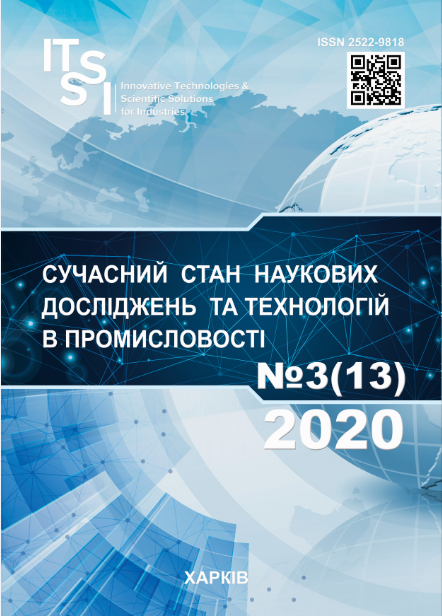MONITORING OF ECONOMIC SECURITY OF ENTERPRISES AND INSTITUTIONS OF SOCIAL INFRASTRUCTURE
DOI:
https://doi.org/10.30837/ITSSI.2020.13.086Keywords:
social infrastructure, monitoring, economic security of enterprises and institutions of social infrastructure, expert systemAbstract
The article is devoted to the study of the formation of the main directions of monitoring the level of economic security of enterprises and institutions of social infrastructure. The subject of the study is a set of theoretical, methodological and practical aspects of the formation of information and analytical support for monitoring the economic security of enterprises and institutions of social infrastructure. The purpose of the article is to develop theoretical and methodological provisions and substantiate practical recommendations for the formation of information and analytical support for monitoring the economic security of enterprises and institutions of social infrastructure. Objectives: to analyze the existing methodological approaches to assess the development of social infrastructure of the regions; improving the system of monitoring the economic security of enterprises and institutions of social infrastructure; to analyze the existing methodological methods for application in the process of monitoring the social infrastructure of the regions. During the research were used methods: abstract-logical analysis, theoretical generalization and systematization. The paper summarizes that the purpose of monitoring the economic security of social infrastructure is to obtain information on the level of efficiency and effectiveness of social infrastructure based on qualitative and quantitative analysis and evaluation of relevant indicators and assessment of the emergence or existence of possible threats and risks. The subject area of monitoring the level of economic security is to determine the integrated indicator of economic security of social infrastructure by the selected functional components. One of the conditions that must be met by the monitoring algorithm is the ability to quantify all the studied indicators to determine the level of economic security of enterprises and institutions of social infrastructure. Conclusions. The process of monitoring the economic security of enterprises and institutions of social infrastructure at the established stages has been improved. Substantiated proposals for improving the methodological approach to assessing the development of social infrastructure of the regions, based on the analysis of existing methodological approaches through the use of private indicators of social infrastructure assessment and allows to take into account the advantages and disadvantages of existing methodological approaches.
References
Niktenko, M. V., Сивограков, O. V., Gavrilov, А. B. et al. (1990), Management of social development of the region, Minsk : Science and Technology, 190 p.
Kazakov, Yu. N., Movchan, B. S. (1991), Development of social infrastructure of economic areas, Мoscow, 141 p.
Merkusheva, L. A. (1989), Geography of public services, Krasnoyarsk : Krasnoyarsk University Press, 184 p.
Seminozhenko, V. P., Danylyshyn, B. M. (2005), New regionalism, Кyiv, 145 p.
Sergeev, I., Kirsanova, N., Kirsanova, I. (2007), "Development of the social sphere: priorities of regulation", Economist, No. 1, P. 46–55.
Korystin, О. E., Baranovsky, O. I., Gerasimenko, L. V. et al. (2010), Economic security : textbook, Кyiv, CST; Center for Educational Literature, 368 p.
Lukyanova, N. G. (2011), "Spatial differentiation of the social infrastructure of a large city: on the example of Smolensk: dissertation abstract for the degree of Cand. geogr. Science: special. 25.00.24 "Economic, social and political geography", Smolensk, 22 p.
"Cluster analysis", available at : http://www.statsoft.ru/home/textbook/modules/stcluan.html
Korotkov, E. M. (1997), Management concept [Kontseptsyia menedzhmenta], Deca, Moscow, Russia.
Litvak, B. G. (2000), Development of the administrative decision [Razrabotka upravlencheskoho reshenyia], Delo, Moscow, Russia.
Wikipedia (2015), "Monitoring", available at: uk.wikipedia.org/wiki/monitoring (last accessed 15 August 2020).
Verkhovna Rada of Ukraine (2003), Law of Ukraine "On National Security of Ukraine", available at: http://zakon.rada.gov.ua (last accessed 15 August 2020).
Wikipedia (2015), "Expert systems", available at: uk.wikipedia.org/wiki/Ekspertnye_sistemy (last accessed 13 August 2020).
Horvath & Partners (2005), Implementation of Balanced Scorecard [Vprovadzhennia zbalansovanoi systemy pokaznykiv], Alpina Business Books, Moscow, Russia.
Downloads
How to Cite
Issue
Section
License
Copyright (c) 2020 Inna Kraivska

This work is licensed under a Creative Commons Attribution-NonCommercial-ShareAlike 4.0 International License.
Our journal abides by the Creative Commons copyright rights and permissions for open access journals.
Authors who publish with this journal agree to the following terms:
Authors hold the copyright without restrictions and grant the journal right of first publication with the work simultaneously licensed under a Creative Commons Attribution-NonCommercial-ShareAlike 4.0 International License (CC BY-NC-SA 4.0) that allows others to share the work with an acknowledgment of the work's authorship and initial publication in this journal.
Authors are able to enter into separate, additional contractual arrangements for the non-commercial and non-exclusive distribution of the journal's published version of the work (e.g., post it to an institutional repository or publish it in a book), with an acknowledgment of its initial publication in this journal.
Authors are permitted and encouraged to post their published work online (e.g., in institutional repositories or on their website) as it can lead to productive exchanges, as well as earlier and greater citation of published work.














